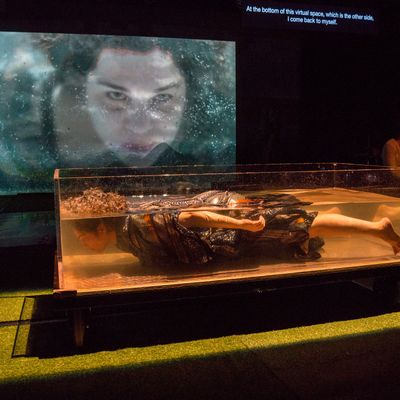
The Brazilian play What If They Went to Moscow? is actually also a movie. It is also sort of ChekhovÔÇÖs Three Sisters, a soulful portrait of women in extremis, and a description of our shared modern malaise. Conceiver-director-editor Christiane Jatahy has room to cram in all this abundance: In a single evening, sheÔÇÖs essentially built two productions in two spaces and two media. Fascinated by the relationship between theater and cinema, Jatahy has made a show thatÔÇÖs both. ÔÇ£One is the utopia of the other,ÔÇØ she tells us, though anyone who has ever despaired at badly shot video in the theater might wonder if screen and stage are actually enemies. But Jatahy has managed a strange and difficult trick. By precisely setting live film and live performance against each other, she makes them into a mise en abyme ÔÇö a mirror that reflects another mirror, leading the eye into infinity.
The audience, too, is split in half. One portion goes to the BAM Fisher Theater, where it watches a loose 90-minute adaptation of ChekhovÔÇÖs classic. Despite major updates ÔÇö birthday girl Irina (Julia Bernat) wants to go to Moscow because she loves Pussy Riot ÔÇö Jatahy and company have captured ChekhovÔÇÖs sense of a slow-moving avalanche. As in the original, the play begins with a party for Irina, hosted by oldest sister Olga (Isabel Teixera) and disrupted by dramatic middle sister Maria (Stella Rabello), who manages to cry, cheer up, and catch a new man between the doorway and the cake. Jatahy introduces another character, though: the camera. Irina films her sisters; videographers peer in through the setÔÇÖs walls; MariaÔÇÖs new lover seduces her almost entirely by pointing a camera at her ÔÇö we see her flower under its gaze.
These cameras record the action; Jatahy and her team then live-edit it into a video version, which the other half of the audience watches simultaneously in a nearby movie theater. (At Brooklyn Academy of Music, the BAM Rose Cinema backs up handily onto the BAM Fisher.) Halfway through the evening, the audiences trade places, and it starts all over again. We see the same 90-minute piece, but in the other medium.
In either room, the adaptation is elegant, then frightening. Most of the show is in Portuguese, but sometimes the women break into English. ÔÇ£Who wants? Who wants?ÔÇØ asks Olga, as she pushes snacks on the theatergoers, who have been invited to the festivities. Well, she wants terribly and painfully: A baby carriage haunts her steps, chasing her strangely across the stage. Irina certainly wants: No one will listen to her when she talks about the terrors of the current Brazilian administration, and she has started cutting herself. And Maria, poor creature, is pure, naked need. This pressure builds into explosions of music and dance, which oscillate between real action and metaphorical gestures. The sisters fling themselves into a tank of water or strip naked or grab an electric guitar. Irina screams a punk song, and poor Olga seems to pass into nightmare. At one point, she appears with mud up to her elbows. Then itÔÇÖs gone. What has she been digging up?
As a demonstration of technique, Moscow is superb. ItÔÇÖs rare to find actors as compelling on a screen as in person, and yet here are three pearls. ThereÔÇÖs also something totally satisfying about the way Jatahy makes her two sections fit together; in the showÔÇÖs final moments, you feel the components mesh, like gears finally finding each other. But ÔÇö and this may be a reflection of my own tribal loyalties ÔÇö itÔÇÖs hard not to watch the show as a kind of competition between theater and film. Given the same piece in both, which medium wins?
For me, it was the theatrical iteration by a mile. Onscreen, Moscow is claustrophobic and dark-spirited, shot mostly in oppressive closeups. Onstage, we see everything against the setÔÇÖs backdrop of lovely honey-colored light and green hills. That softness is gone in the video version ÔÇö cameras are too busy zooming in to reveal the tightness in every smile, and the framing leaves no room for nature. In the cinema section, I actually caught myself remembering the magnificent in-the-flesh half with something like nostalgia.
ThatÔÇÖs part of the showÔÇÖs design: Jatahy wants us experiencing both a fondness for something barely over and a deliberately induced boredom. ÔÇ£Sometimes,ÔÇØ says one of the sisters, ÔÇ£the past is more real than the present.ÔÇØ ThatÔÇÖs true, and Jatahy is clever to point out that we can sometimes sour our experience retroactively. Certainly, I remember how I felt at intermission: I was staggered and delighted and in love. Somehow ÔÇö cleverly and painstakingly ÔÇö the cinema section steadily leached some of those feelings away. Was it the repetition? Or was it the screen? I watched myself grow resentful at a show I was also wholeheartedly admiring. ItÔÇÖs hard, it turns out, to be left wanting.
What If They Went to Moscow? is at the BAM Fisher (Fishman Space) and BAM Rose Cinemas through October 27.


